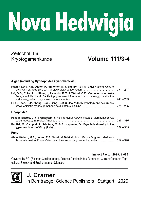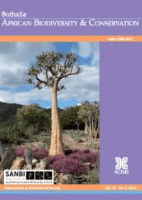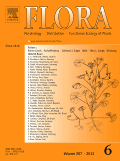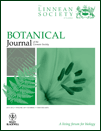
TAXON
Scope & Guideline
Exploring the intricate web of life and its evolution.
Introduction
Aims and Scopes
- Plant Taxonomy and Systematics:
A core focus of the journal is on the classification and description of plant species, including new species and taxonomic revisions, emphasizing the importance of accurate identification and classification in the field. - Biodiversity and Floristic Studies:
The journal consistently publishes studies that document plant diversity in various geographical areas, contributing to the understanding of regional floras and the ecological implications of biodiversity. - Molecular Phylogenetics and Characterization:
There is a significant emphasis on molecular techniques to investigate phylogenetic relationships among plant species, enhancing the understanding of evolutionary patterns and genetic diversity. - Ethnobotany and Medicinal Plants:
Research on the traditional uses of plants, particularly those used for medicinal purposes, reflects the journal's commitment to linking botanical studies with cultural practices and human health. - Environmental and Ecological Studies:
The journal also addresses the ecological aspects of plant communities, including studies on habitat diversity, ecological interactions, and the effects of environmental factors on plant growth and distribution.
Trending and Emerging
- Molecular and Genomic Studies:
There is a growing trend towards molecular and genomic approaches in plant systematics, with an emphasis on chloroplast genome sequencing and phylogenetic analyses, reflecting advancements in technology and methodologies. - Climate Change and Plant Responses:
Research addressing the impact of climate change on plant diversity and distribution is gaining importance, highlighting the relevance of ecological studies in understanding how plant species adapt to changing environments. - Ethnopharmacology and Medicinal Uses of Plants:
Studies focusing on the pharmacological properties of plants and their traditional uses are becoming more pronounced, indicating a renewed interest in the intersection of botany and human health. - Conservation Biology and Biodiversity Assessment:
There is an increasing emphasis on conservation strategies and the assessment of biodiversity, reflecting global efforts to document and preserve plant species in the face of habitat loss and climate change.
Declining or Waning
- Invasive Species Management:
Research focused on invasive plant species seems to have decreased, possibly due to a shift towards documenting native biodiversity and conservation efforts rather than management strategies for invasive species. - Historical Taxonomy:
The focus on historical taxonomy, which involves the study of plant classification from a historical perspective, appears to be waning as contemporary methods and molecular approaches gain prominence. - Traditional Ecological Knowledge:
There appears to be a reduction in studies that integrate traditional ecological knowledge with modern scientific approaches, which may reflect a broader trend in scientific research moving away from qualitative ethnobotanical studies.
Similar Journals

NOVA HEDWIGIA
Championing Excellence in Evolutionary ResearchNOVA HEDWIGIA is a premier journal dedicated to the fields of ecology, evolution, behavior, and systematics, as well as plant sciences. Published by GEBRUDER BORNTRAEGER in Germany, this journal serves as a vital platform for researchers, professionals, and students seeking to disseminate and engage with high-quality studies and findings. With an ISSN of 0029-5035 and an E-ISSN of 2363-7188, NOVA HEDWIGIA has established its significance within these disciplines, reflected in its current Scopus rankings, which place it in the third quartile of both ecology and plant science categories. This esteemed publication has contributed to the advancement of knowledge and innovation since its inception in 1993, continuing through 2024, offering valuable resources for an ever-evolving academic landscape. Researchers looking to contribute to ecological studies or plant sciences will find NOVA HEDWIGIA an ideal venue for sharing their work, nurturing their academic pursuits, and joining a community passionate about the natural sciences.

Acta Botanica Mexicana
Connecting global researchers to ecological challenges.Acta Botanica Mexicana is a premier journal published by Instituto de Ecología AC, dedicated to advancing research in the fields of ecology, plant science, and biological sciences. With an E-ISSN of 2448-7589, this open-access journal facilitates extensive dissemination of scientific findings, ensuring that knowledge is accessible to researchers, professionals, and students worldwide. Established in 2008, Acta Botanica Mexicana has earned a notable reputation, achieving a Q3 ranking in plant science and a Q4 ranking in ecology and evolution for 2023. This positioning underscores its commitment to publishing high-quality research that addresses vital issues in ecological and botanical studies. With a focus on innovative methodologies and pragmatic solutions, the journal invites contributors to share their insights and findings, thus enriching the academic landscape and fostering collaborations that drive the field forward. The journal is based in Michoacán, Mexico, and serves as a key hub for researchers engaging with the challenges and intricacies of plant and ecological studies.

NORDIC JOURNAL OF BOTANY
Exploring Botanical Frontiers with Innovative ResearchNORDIC JOURNAL OF BOTANY, published by WILEY, is a distinguished journal that serves as a vital platform for the dissemination of innovative research in the fields of Plant Science and Ecology, Evolution, Behavior and Systematics. With an ISSN of 0107-055X and E-ISSN 1756-1051, this journal has been a crucial part of the academic landscape since its inception in 1981, continuing to contribute significantly to the literature up to 2024. NORDIC JOURNAL OF BOTANY holds a commendable Q2 ranking in Plant Science and Q3 in Ecology, which underscores its impact and relevance in the scientific community. Despite the absence of Open Access options, the journal offers robust access features that ensure researchers and readers can easily engage with its meticulously curated content. Aimed at both seasoned professionals and emerging scholars, the journal not only publishes high-quality articles but also fosters collaboration and knowledge exchange across various related disciplines, thereby solidifying its role as a cornerstone in botanical and ecological research.

Bangladesh Journal of Plant Taxonomy
Innovating research in plant taxonomy and conservation.Welcome to the Bangladesh Journal of Plant Taxonomy, a leading open-access publication dedicated to advancing the understanding of plant taxonomy in the context of Bangladesh's rich biodiversity. Published by the Bangladesh Association of Plant Taxonomists, this journal plays a crucial role in fostering academic discourse and dissemination of research findings since its establishment. With its ISSN 1028-2092 and E-ISSN 2224-7297, the journal provides a platform for researchers, professionals, and students to share their contributions to plant science. Although it has discontinued its coverage in Scopus from 2018, it remains a valuable resource, evidenced by its rankings in the agricultural and biological sciences categories, including a placement of #330/403 in Plant Science and #515/588 in Ecology, Evolution, Behavior, and Systematics. Open access since 2005, the journal ensures that critical research is freely available to all, supporting the global community in the study and preservation of plant biodiversity.

BOTHALIA
Advancing biodiversity through open access research.BOTHALIA is a prominent open-access journal dedicated to advancing the fields of Ecology, Evolution, Behavior, and Systematics, as well as Plant Science. Published by the South African National Biodiversity Institute (SANBI), this journal has been disseminating valuable research since 1978 and has embraced open access since 2014 to enhance the visibility and accessibility of scientific knowledge. With an ISSN of 0006-8241 and E-ISSN of 2311-9284, BOTHALIA plays a pivotal role in promoting biodiversity research in South Africa and beyond. In the recent Scopus rankings, it has been positioned at Q4 in both relevant categories, highlighting its contributions within the broader scientific community, despite being in its growing phase amidst competitive rankings. The journal aims to publish high-quality articles that address critical issues in biodiversity and ecological sciences, making it an essential resource for researchers, professionals, and students committed to understanding and managing our planet's biological heritage.

PLANT SYSTEMATICS AND EVOLUTION
Shaping the Future of Plant SystematicsPlant Systematics and Evolution is a prestigious journal published by Springer Wien, dedicated to advancing research within the fields of plant taxonomy, evolution, and ecology. With its ISSN 0378-2697 and E-ISSN 1615-6110, this journal has been pivotal in shaping the scientific landscape since its inception in 1974. Based in Austria, it occupies a significant position in the academic community, being ranked in the Q2 quartile in both Ecology, Evolution, Behavior and Systematics and Plant Science as of 2023. This high-impact journal is recognized for its rigorous peer-review process and is indexed among the top publications in its category, holding a Scopus rank of #176 out of 516 in Plant Science and #252 out of 721 in Ecology, highlighting its relevance and quality in the research community. Although it does not currently offer open access, the journal is committed to making significant contributions to the understanding of plant biodiversity and evolutionary processes. This makes it an essential resource for researchers, professionals, and students aiming to know the latest developments in the study of plant systematics and evolution.

FLORA
Illuminating the Path of Plant Science ResearchFLORA is a distinguished journal published by Elsevier GmbH, focusing on the realms of Ecology, Plant Science, and Evolutionary Biology. Established in 1975, this journal has been a vital platform for researchers and professionals, disseminating groundbreaking findings and insights relevant to the plant sciences. With an impressive impact factor and a current Scopus ranking placing it in the second quartile (Q2) across multiple categories, FLORA is recognized as a critical resource for advancing knowledge in its respective fields. The journal publishes both traditional research articles and significant review papers, ensuring a broad spectrum of academic engagement. Although not open access, FLORA remains committed to enhancing the scientific discourse and fostering collaboration among scholars worldwide. Researchers seeking to enrich their understanding of ecological dynamics and plant biology will find FLORA to be an essential addition to their academic repertoire.

Hacquetia
Exploring the Intersections of Ecology and EvolutionHacquetia is an esteemed open-access journal dedicated to the interdisciplinary exploration of ecology, evolution, behavior, systematics, forestry, and plant science. Published by SCIENTO since 2007, this journal has established itself as a pivotal platform for researchers and academics looking to disseminate their findings in these critical fields. Nestled in the heart of Warsaw, Poland, Hacquetia offers unrestricted access to its content, promoting knowledge sharing among professionals, students, and enthusiasts alike. The journal, while ranked in the Q4 category across its relevant disciplines in 2023, serves as a valuable resource for those seeking to contribute to and engage with contemporary ecological and botanical research. Its commitment to open access ensures that cutting-edge research is available to a global audience, fostering innovation and collaboration in the scientific community.

BOTANICAL JOURNAL OF THE LINNEAN SOCIETY
Unveiling the Complexity of Flora and Fauna InteractionsThe Botanical Journal of the Linnean Society, published by Oxford University Press, stands as a premier platform for interdisciplinary research within the realms of Ecology, Evolution, Behavior, and Plant Science. With a notable impact factor reflective of its esteemed reputation, this journal is classified in the Q1 quartile for both Ecology and Plant Science, placing it among the most influential publications in these fields. Since its inception in 1969, and with an anticipated convergence of research extending to 2024, it has become essential for scholars and professionals seeking to engage with cutting-edge studies, theoretical frameworks, and practical applications that drive our understanding of plant biology and ecological systems. The journal’s commitment to excellence is underscored by its robust Scopus rankings—achieving an impressive 83rd percentile in Ecology and a 82nd percentile in Plant Science. This makes the Botanical Journal of the Linnean Society a crucial resource for researchers, educators, and students alike, eager to advance their knowledge and contribute to the evolving discourse in botany and environmental studies.

BRITTONIA
Exploring the Richness of Botany and EcologyBRITTONIA, published by Springer, stands as a reputable journal dedicated to advancing the fields of botany and plant sciences. With a storied history dating back to 1931, this journal has evolved to embrace contemporary research spanning various aspects of plant biology, ecology, and systematics. Focusing on a comprehensive analysis of both ecological interactions and plant systematics, BRITTONIA plays a crucial role in disseminating knowledge among researchers and professionals committed to understanding plant life and its environmental contexts. Despite its open access status being currently unavailable, the journal ensures wide accessibility through institutional subscriptions. In the latest rankings, it proudly holds a Q2 category in Plant Science and a Q3 category in Ecology, Evolution, Behavior, and Systematics, indicating its growing influence and academic rigor. Researchers and students alike will find BRITTONIA an essential resource for the latest findings and discussions in plant sciences.